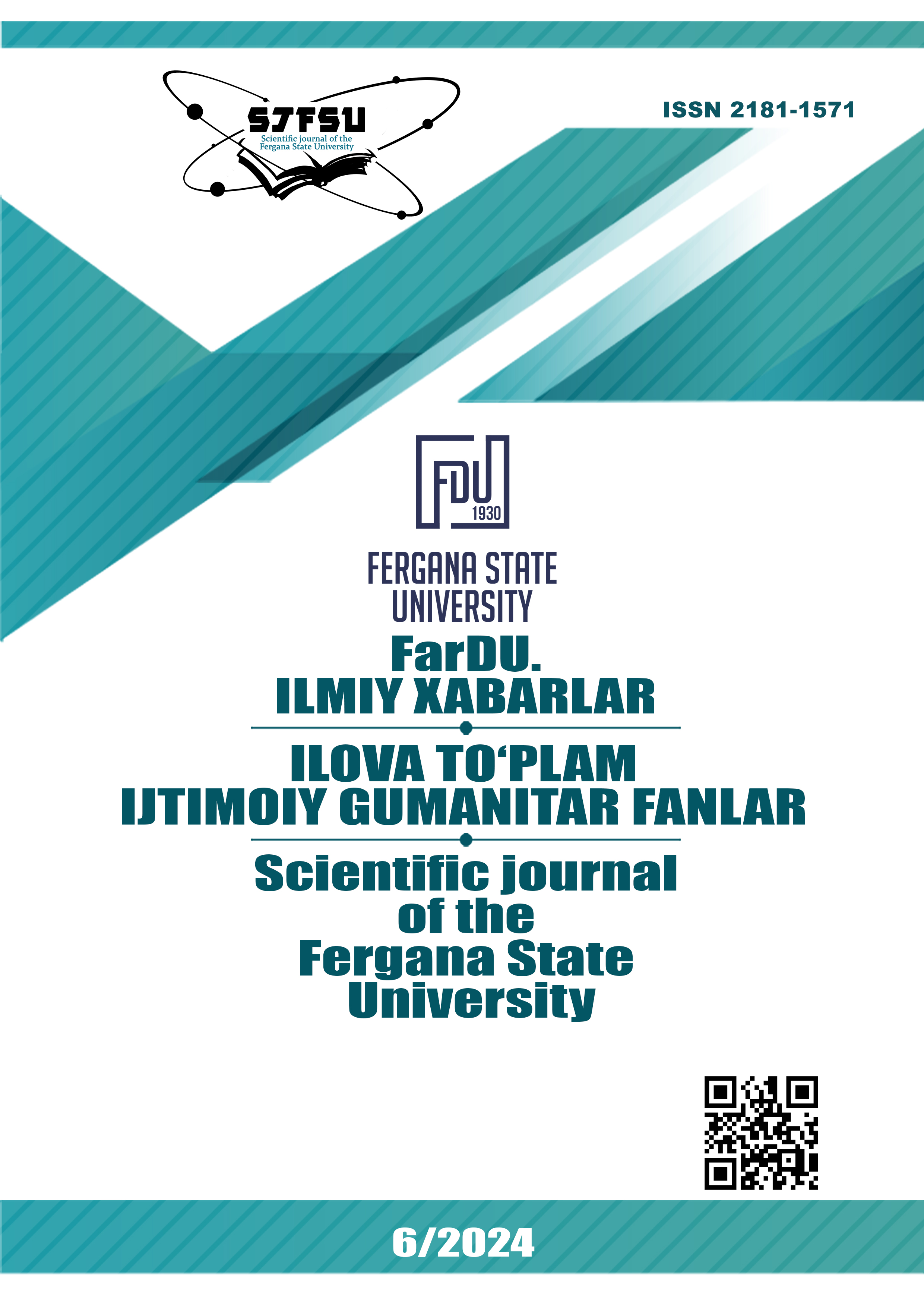Content of developing logical thinking in future educators of upbringing.
Keywords:
logical thinking, upbringing, teacher, pedagogical technology, development, interactive methods, problem-based learning.Abstract
This study focuses on examining the content and methods of developing logical thinking in future educators of upbringing. The research discusses the importance of logical thinking in education and methods for its development through pedagogical technologies. Special attention is given to methods such as interactive teaching, problem-based learning, and others that foster the development of logical thinking.
References
Vygotskiy L.S. (1982). Psikhologiya i obshchestvennaya zhizn'. M.: Pedagogika.
Dewey J. (1997). How We Think. New York: D.C. Heath & Co.
Blum, B. S. (1974). Taxonomy of Educational Objectives, Handbook II: Affective Domain. New York: Longman.
G‘ulomov G., Toshmatov O. (2010). Pedagogik texnologiyalar va ta’lim metodlari. Toshkent: O‘zbekiston.
Sharopov Sh. (2015). Pedagogik texnologiyalar va interfaol metodlar. Toshkent: Fan va texnologiya.
Shunmurodova, N. (2018). Pedagogik texnologiyalarni o‘qitish jarayoniga tatbiq etish. Farg‘ona: Farg‘ona Davlat Universiteti.
Aralov, V. D., & Sultonov, T. A. (2017). Mantiqiy fikrlashning nazariy asoslari. Tashkent: O‘qituvchi.
Robbins, S. P. (2001). Organizational Behavior. Prentice Hall.
Garrison, D. R., & Anderson, T. (2003). E-Learning in the 21st Century: A Framework for Research and Practice. Routledge.
Anderson, C. A., & Dill, K. E. (2000). Video Games and Aggressive Thoughts, Feelings, and Behavior in the Laboratory and in Life. Journal of Personality and Social Psychology, 78(4), 772-790.
Downloads
Published
Issue
Section
License
Copyright (c) 2025 Scientific journal of the Fergana State University

This work is licensed under a Creative Commons Attribution-NonCommercial-NoDerivatives 4.0 International License.
How to Cite
Most read articles by the same author(s)
- , , , , , SYNTHESIS AND STUDY OF THE COMPLEX COMPOUND OF N-(1H-1,2,4-TRIAZOL-YL) ACETAMIDE WITH ZINC (II) CHLORIDE , Scientific journal of the Fergana State University: No. 2 (2025): FarDU ilmiy xabarlari jurnali (Tabiiy fanlar)
- Raximov Quvvatali Ortikovich, Mamatova Zilola Xabibulloxonovna, Tazhikenova Nurzhanar Kabikenkizi, COMMON PHISHING ATTACKS IN KAZAKHSTAN AND WAYS TO PROTECT CITIZENS FROM INTERNET SCAMMERS , Scientific journal of the Fergana State University: No. 3 (2024): FarDU.Ilmiy xabarlar jurnali (Aniq va tabiiy fanlar)
- , , METHODS OF FORMATION OF LOGICAL COMPETENCE IN STUDENTS , Scientific journal of the Fergana State University: No. 3 (2023): FarDU ilmiy xabarlari jurnali (Aniq va tabiiy fanlar)
- , , , , SYNTHESIS AND STUDY OF COMPLEX COMPOUNDS OF 3-AMINO 1,2,4-TRIAZOLE WITH SALTS OF Co (II), Ni (II) AND Cu (II) , Scientific journal of the Fergana State University: No. 3 (2023): FarDU ilmiy xabarlari jurnali (Aniq va tabiiy fanlar)
- , CUSTOMS WHICH ARE CARRIED OUT BEFORE THE WEDDING, ON THE DAY OF THE WEDDING AND AFTER THE WEDDING IN UZBEK AND GERMAN PEOPLE , Scientific journal of the Fergana State University: No. 6 (2023): FarDU ilmiy xabarlari jurnali (Ijtimoy gumanitar fanlar)
- , , TECHNOLOGICAL APPROACH IN IMPROVING THE METHODOLOGY OF GENDER CULTURE DEVELOPMENT OF FUTURE FOREIGN LANGUAGE TEACHERS , Scientific journal of the Fergana State University: No. 4 (2024): Scientific journal of the Fergana State University (Social humanities sciences)
- , EFFECTIVE USE OF EDUCATIONAL TECHNOLOGIES IN THE DEVELOPMENT OF CREATIVE COMPETENCE OF STUDENTS , Scientific journal of the Fergana State University: No. 4 (2024): Scientific journal of the Fergana State University (Social humanities sciences)
- , INTERPRETATION OF THE TRANSLATION OF THE WORK "TARIKH-I-RASHIDI" INTO THE MODERN UZBEK LITERARY LANGUAGE , Scientific journal of the Fergana State University: No. 5 (2024): Scientific journal of the Fergana State University (Social humanities sciences)
- , A LINGUOCULTURAL STUDY OF THE GERMAN LEXICAL UNIT TAUFEN (BAPTISM) , Scientific journal of the Fergana State University: No. 6 (2024): Scientific journal of the Fergana State University ADDITIONAL COLLECTION (Social humanities sciences)
- , DEGREE OF STUDY OF THE CATEGORY AUTHORIZATION AT TEXT LEVEL , Scientific journal of the Fergana State University: No. 3 (2024): Scientific journal of the Fergana State University. Application set (Social humanities sciences)

